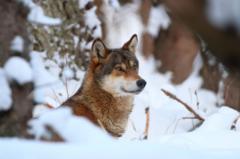As winter settles in the Carpathian mountains of Romania, the European Commission is poised to propose significant changes to the legal status of wolves across Europe. Currently classified under Annex II of the Bern Convention as strictly protected, wolves may be downgraded to Annex III, a move that would allow individual EU nations the discretion to set quotas for culling.
With the wolf population in Europe reportedly swelling from approximately 11,000 in 2012 to above 20,000 today, the Commission cites livestock damage as a primary reason for the proposed changes. Shepherds like József Rácz, who manages a flock of 500 ewes, feel the impact of predators directly. Rácz admits he loses several sheep annually to wolves and bears, prompting him to rely on a team of 17 dogs for protection.
However, conservationists argue for maintaining the current protections, believing that effective non-lethal solutions, such as trained livestock guardian dogs and enhanced practices for managing wolves, can mitigate conflicts. They emphasize the ecological benefits of wolves, including their role in controlling populations of deer and wild boar, which can have detrimental effects on forestry and agriculture, and their ability to help curb disease spread by preying on sick animals.
Discussions among wildlife experts reveal mixed opinions on the wolf population. While many advocate against culling, citing a 2023 EU report that indicates wolves kill a mere fraction—about 0.065%—of the total sheep and goats in Europe, farmers like Rácz maintain that the potential predation on livestock could escalate with rising wolf numbers. He recalls the loss of his trained dog Moody at the hands of wolves, emphasizing the threat they pose.
Advocates for wildlife protection, including Laurent Schley from Luxembourg’s Wildlife department, stress the importance of finding a balance between conservation efforts and human interests. Schley contends that protecting certain species is part of a broader moral obligation, especially for wealthier nations. As more EU countries grapple with ancient predator populations, the conversation around managing wolves becomes increasingly nuanced, raising questions about agricultural sustainability, human safety, and environmental stewardship.





















